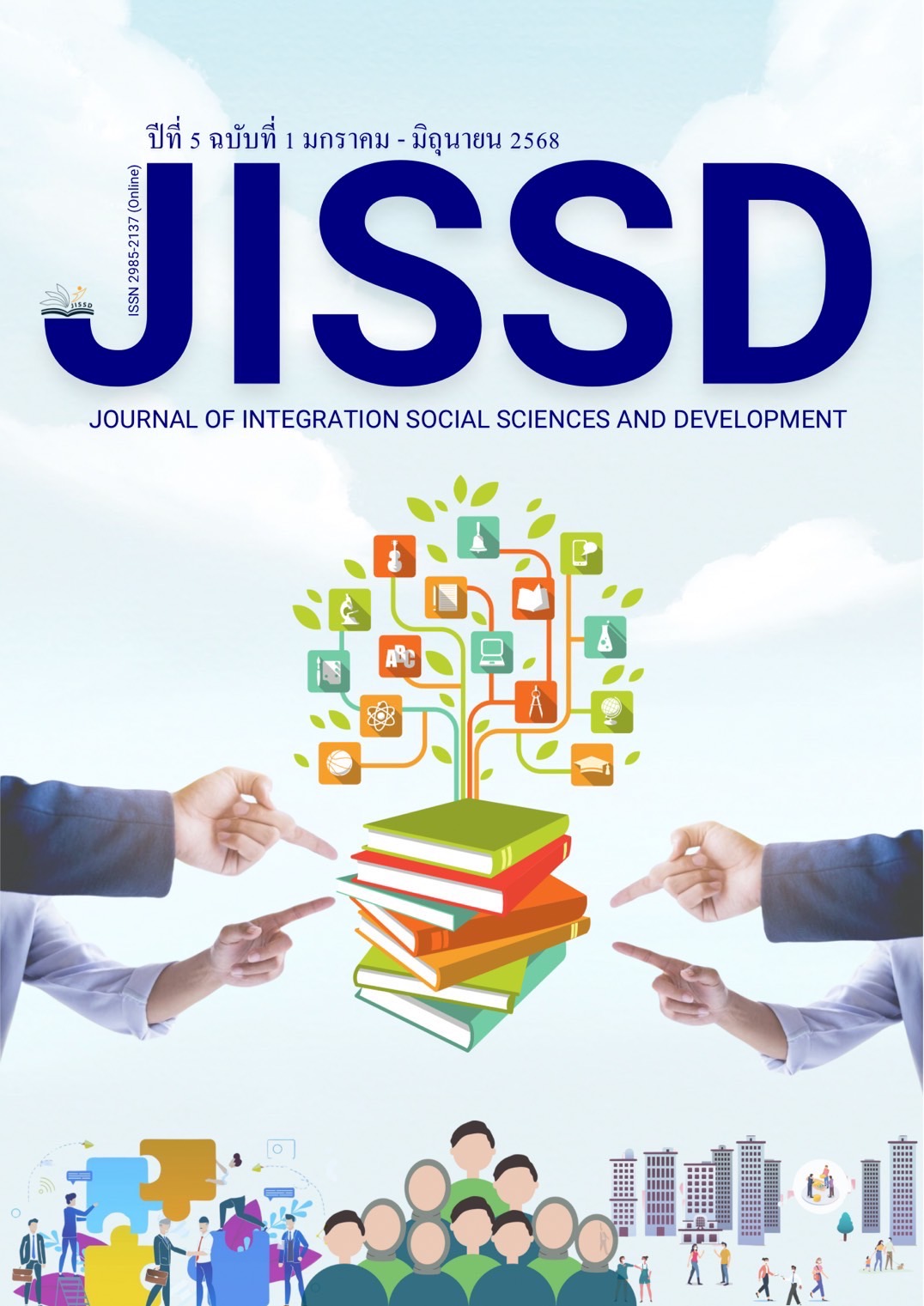The Effects of Using Online Games to Develop English Grammar of North Bangkok University Students
Main Article Content
Abstract
This experimental research aimed to (1) compare English grammar learning achievement before and after using online games, and (2) investigate students' attitudes toward learning English grammar through online games. The sample consisted of 40 first-year undergraduate students majoring in Information Technology and Digital Innovation in the Faculty of Information Technology and Digital Innovation at North Bangkok University, selected through cluster random sampling. The research instruments included (1) learning management plans using online games, (2) pre-test and post-test on English grammar knowledge, and (3) a questionnaire on attitudes toward learning English grammar through online games. The research was conducted over one academic semester, with students participating in online game-based grammar activities for 16 hours, focusing on essential grammatical structures including tenses, articles, prepositions, modal verbs, conditional sentences, passive voice, relative clause and reported speech. The statistics for data analysis were mean, standard deviation, and t-test.
The results revealed that (1) students' English grammar knowledge after using online games was significantly higher than before at the .01 level, with particularly notable improvements in verb tense usage and sentence structure construction, and (2) students had positive attitudes toward learning English grammar through online games with the overall mean at a high level. Students reported increased motivation, reduced anxiety about grammar learning, and greater participation in classroom activities.
Article Details
References
กิ่งกมล ศิริประเสริฐ. (2564). ผลการจัดการเรียนรู้โดยใช้ห้องเรียนกลับด้านร่วมกับเกม Kahoot วิชาภาษาอังกฤษ ที่มีต่อ ผลสัมฤทธิ์ทางการเรียนและการกำกับตนเองของนักเรียนชั้นมัธยมศึกษาปีที่ 2. วารสารวิจัยและนวัตกรรม สถาบันการอาชีวศึกษากรุงเทพมหานคร, 4(2), 157 – 180.
ณัฏฐา ผิวมา. (2566). ผลการจัดการเรียนรู้แบบผสมผสาน (Blended Learning) โดยใช้เกมเป็นฐาน ที่มีต่อผลสัมฤทธิ์ทางการเรียน เรื่องคำศัพท์ ไวยากรณ์ สำนวนเพื่อการนำเสนอเป็นภาษาอังกฤษอย่างเป็นทางการ รายวิชาภาษาอังกฤษเพื่อ การนำเสนอของนักศึกษา สาขาวิชาวิทยาการคอมพิวเตอร์ มหาวิทยาลัยสวนดุสิต. วารสารวิชาการเทคโนโลยีการจัดการ, 4(2), 84–96.
ยงยุทธ แก้วเต็ม. (2566). ผลของโปรแกรมการเรียนรู้แบบเกมดิจิทัลและการเรียนรู้ผ่านสื่อสังคมออนไลน์ ต่อความรู้ ทักษะการ ป้องกันการเกิดเหตุการณ์ไม่พึงประสงค์ทางคลินิก. วารสารวิชาการ มหาวิทยาลัยราชภัฏอุตรดิตถ์, 18(1), 21–40.
รภัส ชัยขจรวัฒน (2564) ผลการใช้เกมออนไลน์ที่มีต่อความรู้คำศัพท์ภาษาอังกฤษของนักเรียนชั้นประถมศึกษาปีที่ 4 - 6 โรงเรียนวัดบำเพ็ญพรต (ประมาณราษฎร์วิทยานุสรณ์) จังหวัดสระบุรี. วิทยานิพนธ์ปริญญามหาบัณฑิต, มหาวิทยาลัยสุโขทัยธรรมาธิราช. คลังปัญญามหาวิทยาลัยสุโขทัยธรรมาธิราช.
อรอนงค์ ธรรมจินดา. (2565). ผลของการบูรณาการเกมออนไลน์เพื่อส่งเสริมการเรียนรู้เรื่องเพศวิถีศึกษาแบบรอบด้าน ต่อ ความรู้และความพึงพอใจของนักเรียนชั้นมัธยมศึกษาตอนต้น. วารสารวิจัยการพยาบาลและวิทยาศาสตร์สุขภาพ, 14(1), 47 – 61.
Anyaegbu, R., Ting, S. H., & Li, C. S. (2012). Serious game motivation in an EFL classroom in Chinese primary school. TOJET: The Turkish Online Journal of Educational Technology, 11(1), 154–161.
Deesri, A. (2002). Games in the ESL and EFL class. Peter Lang, New York.
EF English Proficiency Index. (2023). EF EPI 2023 - EF English Proficiency Index. Peter Lang, New York.
Gee, J.P. (2007). Good Video Games and Good Learning: Collected Essays on Video Games, Learning and Literacy. Peter Lang, New York.
Keller, J. M. (2010). Motivational Design for Learning and Performance: The ARCS Model Approach.Springer.
Kirkpatrick, A. (2017). World Englishes: Implications for international communication and English language teaching. Cambridge University Press.
Kolb, D. A. (1984). Experiential learning: Experience as the source of learning and development. Prentice-Hall.
Krashen, S. (1985). The input hypothesis: Issues and implications. New York: Longman.
Pongsatorn Pawabutra. (2024). An analysis of grammatical errors in English speaking of Thai EFL learners. Journal of English Language and Linguistics,5(3), 297-313.
Plass, J. L., Homer, B. D., & Kinzer, C. K. (2015). Foundations of Game-Based Learning. Educational Psychologist, 50, 258-283.
Plass, J. L., Mayer, R. E., & Homer, B. D. (2020). Handbook of game-based learning. Massachusetts, U.S.A: MIT
Press.
Prensky, M. (2019). Digital game-based learning (2nd ed.). McGraw-Hill Education.
Saengboon, S. (2017). English grammar and Thai university students: An insurmountable linguistic battle. English Language Teaching, 10(11), 22–33.
Teng, F., & Sinwongsuwat, K. (2015). Thai university students' problems of language use in English speaking. LEARN Journal: Language Education and Acquisition Research Network, 14(2), 601–617.
Vygotsky, L. S. (1978). Mind in society. The development of higher psychological processes. Cambridge: Harvard University Press.
Yolageldili, G., & Arikan, A. (2011). Effectiveness of using games in teaching grammar to young learners. Elementary Education Online, 10(1), 219–229.


